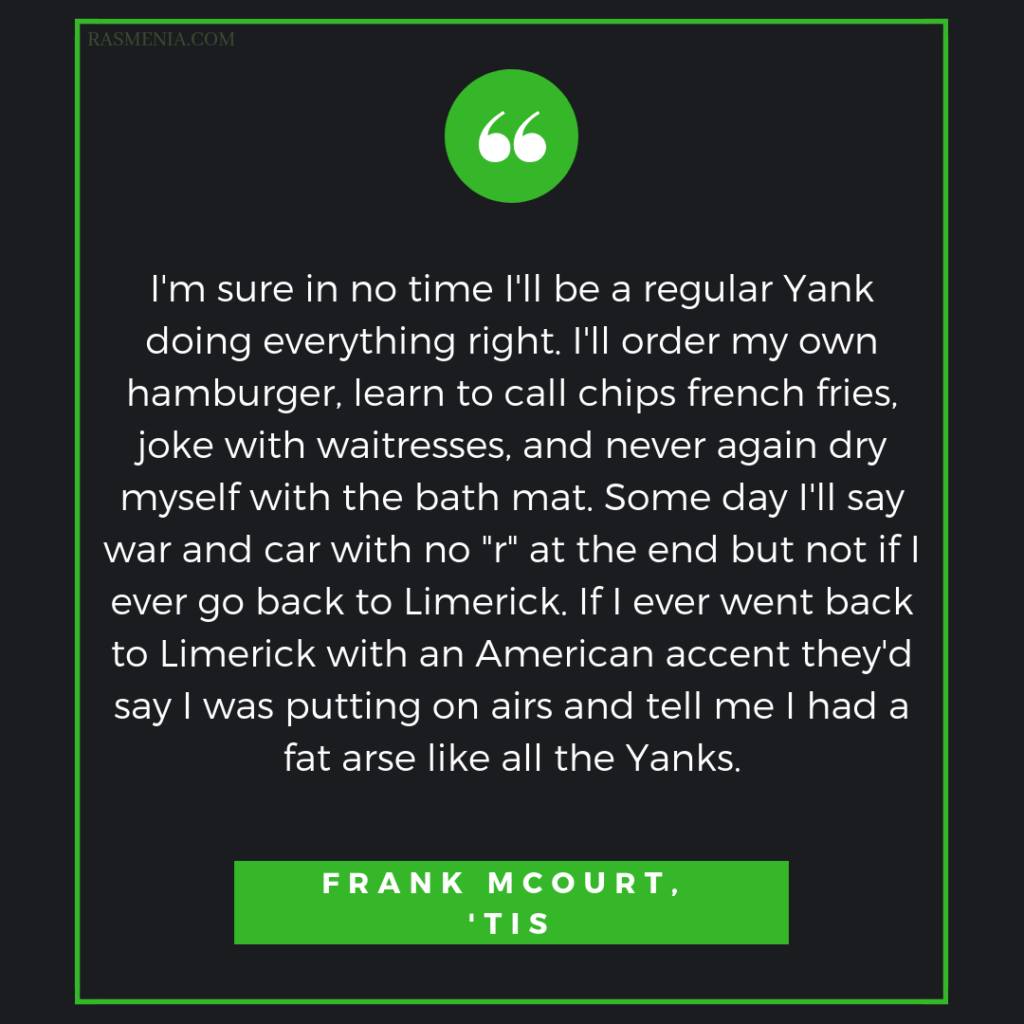There’s a scene in Highlander where our hero, the immortal Connor MacLeod, gets hauled in by the New York City popo for engaging in some swordfight and beheading shenanigans in a parking lot during a wrestling match. During the questioning, a cop tells him he talks funny, and asks where he’s from. Without hesitation, 450 year-old MacLeod answers, “Lots of different places.”
He talks funny because he’s a French actor portraying a 16th century Scottish man. If you suspend your disbelief and allow yourself to have fun, he speaks this way because he’s been wandering the globe for more than 400 years and it’s distorted his accent into something that can’t be identified.
I wanted that. The first few months I spent living abroad, I was certain that it was only a matter of time before my American accent softened. That after years of being immersed in a sea of French language, my English would become smoother at the edges where the French had touched it. I never believed I would lose my American accent. That seemed absurd. I just thought it might evolve into an accent that was harder to identify. A couple of my American friends, around the time I left the States, suggested to me, “Oh, you’ll eventually become so fluent in French that you probably won’t even remember how to speak English anymore.” That idea seemed even more ridiculous than the thought of losing my accent altogether.
A month or so after I moved overseas, I was living in Paris, having lunch with another American who’d been residing in the city for the past seven years. Engaging in conversation with her tested my patience, because every few sentences, she’d pause, furrow her brow, and ask, “Oh, what’s the word in English… I forget. I’ve just been living here so long.”
I’ll allow anyone the occasional brain fart, but… seven years isn’t all that long, certainly not long enough to forget your native language. It also struck me that since she worked as an interpreter, forgetting one of the languages she was being paid to interpret made her seem less glamorous and worldly and more like someone in the wrong line of work.
The thing is, this little drama was for my benefit. I went on to witness several more of these one-person shows over the years, but never from the same performer twice. Because if it happened once, I avoided that person afterward. I mean, we could all live here together and navigate the awkwardness side-by-side, but if you’d rather turn it into some weird competition of who’s more European now, then you can be the winner while I go bum around the kebab or some other place with immigrants who are a little less douche.

On the other end of the spectrum, I noticed a funny thing among the French people when they speak English in front of one another: they do it with an exaggerated French accent. Standing in the tabac with a friend one afternoon, she asked the clerk for a pack of American Spirits, but pronounced it in such a way that made it sound as though she couldn’t speak English. When I mentioned this to her, she said, “Oh, we must speak English this way. If our English doesn’t sound French enough, it’s being a snob.”
More recently, here in England, a fellow American resident said, “Ugh… Now that I’ve been living here a few months and have picked up an accent, fake English accents make me cringe. Michael C. Hall’s accent in Safe is dreadful.”
Yeah, maybe it is dreadful, but now that I’ve been living here a few years and have picked up some of the vernacular, well… you’re a frickin’ prat, dude.

I lived in France for ten goddamn years and when I left, I sounded the same as the day I arrived. With some new vocabulary to be sure, but no indistinguishable accent. I didn’t sound at all like the Highlander. I sounded like me.
This was disappointing, but then again, maybe it was a good thing. I decided my inability to adopt a new accent prevented me from sounding like a pretentious ass. People like Madonna who go from New York one day then Buckingham Palace the next are often the butt of jokes. For good reason. They sound ridiculous to people back home. Even though it was the funniest episode in the show’s history, that Jennifer Coolidge episode of Friends nails it.
After spending the past three years in England, my hard American edges have yet to be softened. My diction isn’t evolving much, and that’s okay. I don’t understand why other people make an effort to adopt an accent, and that’s okay, too. They can do what they want and I can go on judging, deciding they sound like pretentious phonies.
I made peace with the fact that I’d never talk funny like Connor MacLeod. (I also would never be an immortal swordsman, another truth I am finding hard to swallow.) I go about my day sounding as American as ever, although the occasional bit of language potpourri slips out, such as, “Dude, that connasse is a cheeky fucker.” I enjoy my newly expanded vocabulary, in my same old boring American accent.
I mean, yeah… occasionally other Americans have expressed surprise when they hear I’m from Colorado. “Really? I would’ve guessed Chicago with that accent,” is a thing they sometimes say. Or, “Huh. You ever lived in California at all? You sound a little Californian.”
Apparently, some other Americans think I talk funny. But, not here. Not in England where people frequently ask what part of America I’m from, or if I’m Canadian. That is, until the day my husband Olivier and I were making small talk with a stranger who commented on our accents and asked where we were from.
“I’m from Colorado.” I nodded toward my husband. “And he’s French.”
The stranger squinted, tilted his head. “Really? Your accents must be mingling together. I thought maybe you were both Dutch.”
Hey, it’s not exactly like Highlander, but I’ll take it.
Well said my dear! I could never understand why people picked up an accent when they moved somewhere. Loved it!
Funny thing about accents. After talking on tbe phone to my cousin in Texas for about 2 minutes I suddenly develop a southern drawl……y’all.